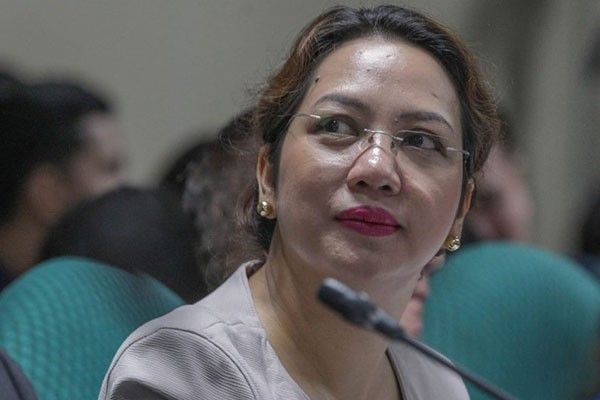DOJ probe shows Garin warned of Dengvaxia risks

MANILA, Philippines — Former health secretary Janette Garin was warned of risks posed by the anti-dengue vaccine Dengvaxia but still proceeded with the immunization program in 2016 that allegedly led to deaths and serious illnesses of school children.
This was revealed yesterday in the continuation of the preliminary investigation of the Department of Justice (DOJ) on alleged criminal liabilities of Garin and 35 others for the deaths of at least nine children inoculated with the controversial vaccine.
Public Attorney’s Office (PAO) chief Persida Acosta, who serves as counsel for parents of the victims, presented evidence showing Garin was aware of possible repercussions of the vaccination program and still opted to pursue it.
Acosta cited a March 27, 2016 letter of health and medical experts from various organizations supposedly received by Garin, which strongly warned against and opposed the implementation of the program.
The letter, signed by representatives from National Academy of Science and Technology, Philippine Medical Association, University of the Philippines College of Medicine, Philippine College of Physicians, University of Sto. Tomas, Action for Economic Forum and Woman Health, raised questions on the efficacy of the vaccine that was still on clinical trial stage.
The experts informed Garin of “possible harm from the vaccine” that they believed was not cost effective.
“The possibility of harm is real because the vaccine does not have a consistent effect on all serotypes of the dengue virus. Because of this, there is a possibility of immunologic enhancement, resulting in more severe diseases from a different virus serotype,” they told the former health chief.
The group stressed the P3.5-billion program was costly, considering the lack of guaranteed efficacy and that a new generation dengue vaccine, TV003, that could have better efficacy at a lower cost was also available at that time.
“The cost-effectiveness study used by DOH (Department of Health) was commissioned by the drug company producing the vaccine and has not been published... We believe an independent analysis needs to be performed,” they suggested.
But despite these warnings from the experts, Garin still decided to pursue the vaccination program in April 2016 with manufacturer Sanofi Pasteur Inc. and distributor Zuellig Pharma Corp.
Apart from the letter from the experts, Acosta also presented to the investigating prosecutors documentary records where Sanofi admitted to these risks posed by their vaccine.
She specifically submitted documents from the National Formulary in December 2015 where the pharmaceutical firm admitted that the vaccine could lead to more severe diseases.
Sanofi said Dengvaxia could lead to allergic or anaphylactic reaction, viscerotropism and neurotropism, increase in severity of dengue diseases from start of vaccination and waning protection against dengue disease.
Acosta lamented that despite this admission by Sanofi, Garin proceeded with the vaccination program and inoculated Dengvaxia on over 800,000 children.
In yesterday’s hearing, the lawyers of Garin and other respondents received copies of the complaints filed by parents of Aejay Bautista, Angelica Pestilos, Lenard Baldonado, Zandro Colite, Abbie Hedia, Jansyn Bataan, Mark Axel Ebonia, Rey Justin Almagno and Alexander Jaime.
They were given until the next hearing on June 25 to answer the charges for reckless imprudence resulting in homicide under Article 365 of the Revised Penal Code.
Apart from Garin and other former health officials, the complaints also named as respondents the executives of Sanofi and Zuellig.
A separate panel of prosecutors is investigating the complaint filed by anti-corruption groups Volunteers Against Crime and Corruption (VACC) and Vanguard of the Philippine Constitution Inc. (VPCI) against former president Benigno Aquino III over the Dengvaxia vaccine controversy.
Aquino and 43 other respondents were earlier ordered to appear at the next hearing set for June 4 to answer the charges of multiple homicide and physical injuries under the Revised Penal Code, malversation of public funds and violations of Republic Act 3019 (Anti-Graft and Corrupt Practices Act) and RA 9184 (Government Procurement Reform Act).
On the other hand, the regional DOH director in the Calabarzon region sought the help of private hospitals for treatment of children vaccinated by Dengvaxia.
Eduardo Janairo said they have signed a memorandum of agreement with seven private health facilities.
“With this partnership, we can assure all Filipinos, rich and poor, that they will be provided with the proper medical assistance knowing that the DOH and private hospitals are working together to provide them the required financial assistance,” he said.
Under the agreement, private hospitals would render medical services to qualified patients with the regional DOH footing the bill.
Janairo assured payments to the private hospitals will be prompt and immediate so as not to disrupt their daily operations.
He stressed the need for public and private sectors to work together in providing primary health care to the people, regardless of economic status.
Public hospitals should administer appropriate treatment to qualified patients, not only indigents but also those in the middle and upper class.
“We will be providing 100 percent medical assistance to all, even to those who are considered wealthy because they too spend much for health care and also need assistance,” Janairo said.
He said indigent or wealthy patients are still Filipinos and thus entitled to medical assistance under the Universal Health Care Program. – With Mayen Jaymalin
- Latest
- Trending
































